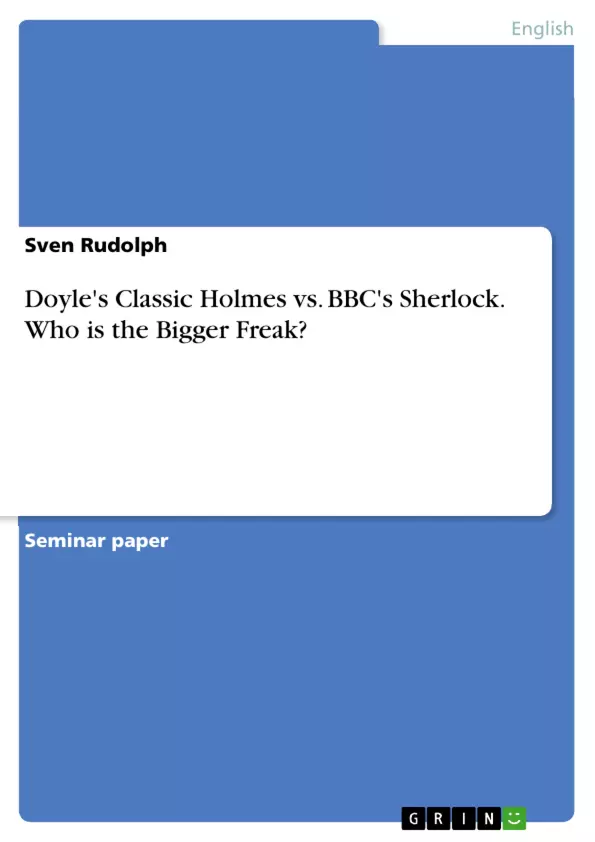“Well, Watson, what do you make of it?” (Doyle 1) – Or rather: What did, and does, the media make of Arthur Conan Doyle’s crime-solving character Sherlock Holmes? Without a doubt, Sherlock Holmes is one of the most famous literary figures, if not the most famous, at least in the genre of crime fiction.
Holmes had his first appearance in 1887 in A Study in Scarlett, which was published in Beeton’s Christmas Annual. In this story, he is introduced as the world’s first and only “consulting detective”. In other words: Sherlock Holmes starts investigating when the police fail in solving the crime. (Wilson) Since his introduction he has had other appearances in numerous stories of Doyle, countless pastiches and he has literally taken over the media landscape.
Among these appearances in the media, there are two TV shows contrasting from all the other Holmes adaptations. On the one hand, there is Elementary. It is set in New York and the American actress Lucy Liu plays Holmes’s assistant and friend, Dr Watson. Jonny Lee Miller plays Holmes. On the other Hand, there is the British series Sherlock. It is set in London and the role of Watson is portrayed by male actor Martin Freeman, which means that Sherlock is more oriented towards the original stories. However, both series have something in common: They transfer Doyle’s stories, which are set in Victorian and Edwardian times, into the present age.
In this paper, I want to compare the classic character Sherlock Holmes, as he appears in Doyle’s stories and Novels, with the main character Sherlock Holmes of BBC’s TV series Sherlock. The literary basis for my analysis will be the novel the Hound of the Baskervilles by Sir Arthur Conan Doyle and of course the TV series Sherlock. The first part of this paper will consist of a characterisation of the classic Sherlock Holmes. The second part will be an analysis of the main character of Sherlock. In the course of this paper, I want to provide the answer to the question: Who is the bigger freak, if any of them is one at all?
Inhaltsverzeichnis (Table of Contents)
- Introduction
- Doyle's Classic Holmes
- BBC's Sherlock
- Conclusion
Zielsetzung und Themenschwerpunkte (Objectives and Key Themes)
The main goal of this paper is to compare the classic character Sherlock Holmes from Arthur Conan Doyle's stories and novels with the contemporary character Sherlock Holmes from the BBC TV series Sherlock. By analyzing Doyle's "The Hound of the Baskervilles" and the BBC series Sherlock, the paper aims to answer the question: Who is the bigger freak?
- Character analysis of classic Sherlock Holmes
- Comparison of classic Sherlock Holmes to BBC Sherlock
- Analysis of Sherlock Holmes's detecting abilities
- Exploration of Sherlock Holmes's emotional state
- The impact of Sherlock Holmes's "freakishness" on his character and actions
Zusammenfassung der Kapitel (Chapter Summaries)
- Introduction: This chapter introduces the reader to the iconic character Sherlock Holmes, highlighting his popularity and influence in the world of crime fiction. The chapter also mentions two contemporary TV series, Elementary and Sherlock, which adapt Doyle's stories to a modern setting.
- Doyle's Classic Holmes: This chapter delves into the portrayal of Sherlock Holmes in Doyle's stories, particularly focusing on his character as described by his friend John Watson in "The Hound of the Baskervilles." The chapter explores Holmes's arrogance, perfectionism, and his seemingly emotionless nature.
- BBC's Sherlock: This chapter focuses on the BBC series Sherlock, highlighting its success and its unique portrayal of the detective in a modern context. The chapter touches upon the differences between the classic Sherlock and the BBC version, particularly in terms of setting and characterization.
Schlüsselwörter (Keywords)
The primary keywords and focus topics of this paper include: Arthur Conan Doyle, Sherlock Holmes, "The Hound of the Baskervilles," BBC Sherlock, crime fiction, detective fiction, character analysis, freakishness, emotion, observation, detection, intuition, modern adaptation, media landscape.
- Quote paper
- Sven Rudolph (Author), 2013, Doyle's Classic Holmes vs. BBC's Sherlock. Who is the Bigger Freak?, Munich, GRIN Verlag, https://www.grin.com/document/272115



